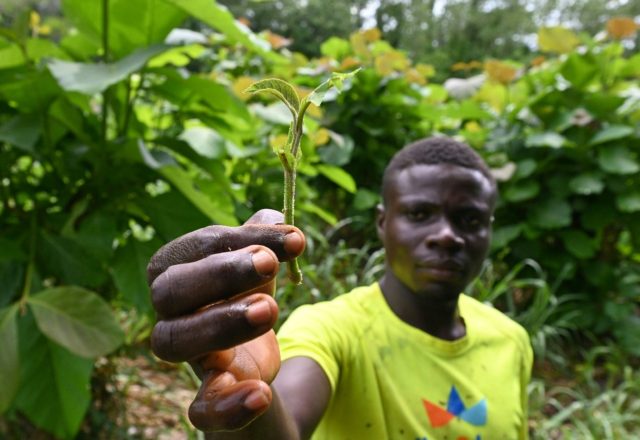Forest rangers in olive-green fatigues snap to attention, ready for their commander’s orders.
Their presence gives a military feel to a campaign to help Ivory Coast regain the emerald forests it has catastrophically lost, along with the elephants and other wildlife that once teemed there.
Here, in the Tene Forest in southern-central Ivory Coast, are nurseries of seedlings aimed at restoring the West African nation’s green jewels.
Ivory Coast is the world’s largest producer of cocoa and a major producer of coffee.
The crops generated wealth but the cost was disastrous for the forests, which were ripped up to make way for plantations.
Forests covered more than 50 percent of the country’s area at independence in 1960 — today, it is just 11 percent.
Of those that remain, all 234 forests officially classified as protected are being nibbled away by global warming, natural disasters, soil impoverishment and population expansion.
By some estimates the country’s deforestation rate is at around three percent annually — a trend that, environmentalists warn, could wreck ecosystems and threaten the livelihoods of millions of smallholder farmers.
“By 2030-2035, Ivory Coast won’t have any forests left if we do not fight against abusive exploitation,” the minister of water and forests, Alain Richard, told AFP.
Military-style operation
Tene, a forest of 30,000 hectares (75,000 acres) is the largest site where the state-owned Company for Development of Forest Plantations (Sodefor) grows seedlings to replant teak, African whitewood, Ivory Coast almond and other coveted species.
The day’s work in the lush haven of cashew and teak trees begins with the rangers — paramilitaries with the Water and Forestry Service — saluting the orange-white-and-green national flag.
After receiving their orders, the rangers then go to supervising dozens of workers as they descend on the nursery to tend to their leafy charges.
Every year, millions of seedlings are sent from Tene to areas scheduled for reforestation.
“Reforestation affects the entire territory of Ivory Coast,” explained Colonel Mathieu Oulea of the Water and Forests service. “This nursery is where we raise the plants to do it.”
Public support
The goal is to replant six million hectares (15 million acres) by 2030 — equal to a fifth of the country’s area.
Half of this area will be forests, for which some three billion trees will be needed, said Donwahi.
To meet the challenge, the authorities have established a public-private partnership requiring 616 billion CFA francs (939 million euros / $1.1 billion) of investments over 10 years.
As in other countries in Africa, they are also counting on public support.
Two years ago authorities launched a “National Tree Day” in which millions of seedlings are replanted over 24 hours.
“Each Ivorian has to become be a tree planter. Everyone will have to participate in reforestation — we have destroyed more than 80 percent of our forest cover,” Donwahi said.
“This is not an option, it is a necessity to save Ivory Coast.”
‘Green brigade’
Last year, the country set up its first “green brigade” — a unit of 650 soldiers assigned to fight against deforestation and other forest crimes.
One of its companies defends the forests, another the nation’s water resources and the third Ivorian elephants and other fauna.
Extensive deforestation has destroyed the natural habitat of endangered wildlife, including elephants, whose numbers have dropped by half in 30 years. Today fewer than 500 remain.
According to the minister of water and forests, the new policy has provided for “a corridor to enable elephants to move from one place to another and the creation of sanctuaries for the pachyderms to live protected.”

COMMENTS
Please let us know if you're having issues with commenting.